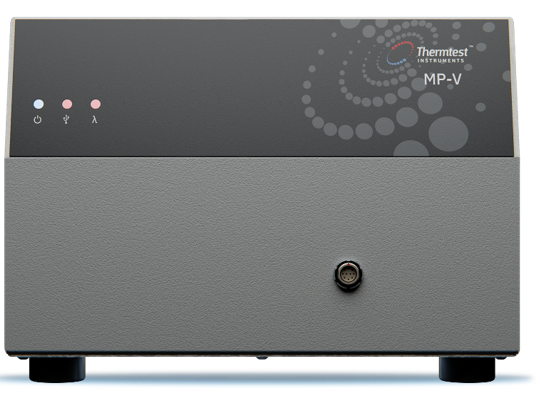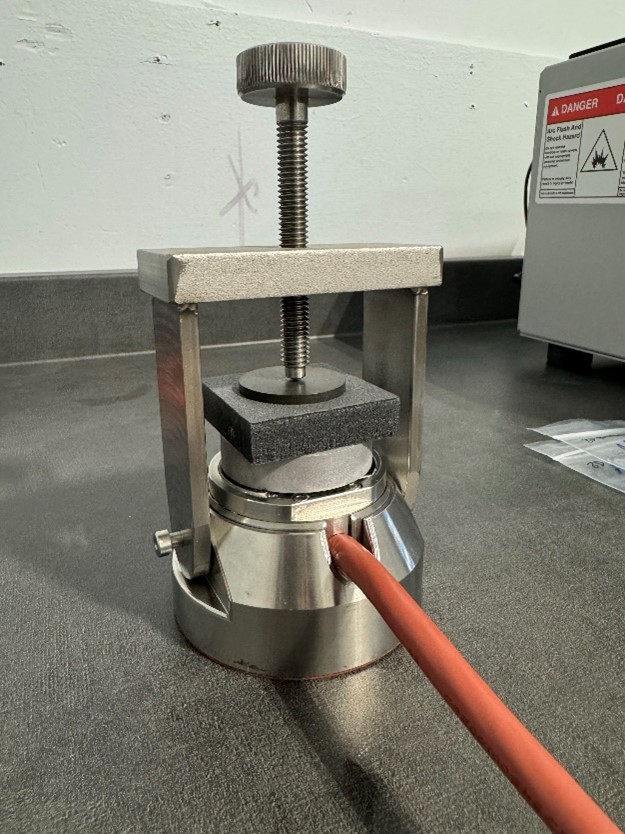The rise of 3D printed metals has been a significant development in the field of additive manufacturing over the past decade. 3D printing with metals has seen rapid growth and adoption in various industries including aerospace, automotive, medical, and industrial manufacturing. The thermal conductivity of 3D printed metals is an important property that has significant implications for their performance and applications. Knowing the thermal conductivity is crucial for several reasons including heat dissipation, material performance, design optimization, and overall quality of the material.
In this application note we will be exploring how well Thermtest’s MTPS sensor paired with MP-V can measure the crucial thermal properties for expanding and optimizing the performance of 3D printed metals.
The MP-V is designed to test the absolute thermal conductivity, thermal diffusivity, specific heat and thermal effusivity of solids, liquids, pastes and powders. The MP-V features a powerful combination of the transient plane source (TPS, ISO 22007-2) and transient hot-wire (THW, ASTM D7896-19) methods with a variety of sensors that are compatible with it.
Transient methods share similar theories with differences that are specific to their primary design. The sensors are electrically connected to a power supply and sensing circuit.
An electrical current passes through the sensors and creates an increase in temperature, which is recorded over time. The heat generated is then diffused into the sample at a rate dependent on the thermal transport characteristics of the material.

Figure 1. Measurement Platform Versatile (MP-V).
The MP-V features the proprietary intelligent Transient Plane Source (iTransient) function that is designed for automation of testing and analysis. iTransient requires only the sample name as user input and the appropriate sensor and test parameters for each individual sample are determined.
The MP-V with the TPS Slab module is used to measure the thermal conductivity of thin sheet materials (with moderate to high thermal conductivity) and of uniform thickness. Measurements can be made symmetric or asymmetric.
The MTPS sensor is comprised of a TPS sensor configured with known backing insulation, permanently housed in a rugged single-sided configuration. This unique design combines intelligent design of sensor and measurement capabilities to generate bulk and directional properties for all materials. This sensor is capable of testing isotropic, anisotropic, slab and one-dimensional samples.
For this application we measured 3D printed aluminum using the MTPS sensor and our versatile measurement platform (MP-V) with the Slab modifier.
The result from asymmetric slab testing with the MTPS were in good agreement to slab symmetric testing previously done using a 3317-1 (12.8 mm Ø) sensor.
The 3D printed aluminum was tested in asymmetric configuration using the MTPS sensor and MP-V. The sample was placed directly on top of the sensor and a piece of XPS foam was added on top. The MTPS sensor acts as insulative backing on one side of the sample and an insulative piece of foam (XPS) is used as insulative backing on the other side of the sample. This backing material enforces the boundary condition such that there is no heat transfer to the upper and lower edges of either sample.
Therefore, it is important to select a backing material that is much less conductive than the test sample to increase the sensitivity of the measurement. A protective disk was then placed over the foam and the top screw was tightened down to a ¼ turn past finger tight (Figure 3). Measurements were run at room temperature with optimal testing parameters of 2 seconds and 1000mW.

Figure 3. Experimental set-up
3D printed aluminum, 12.5 mm thick with a diameter of 50 mm, was measured at ambient temperature. Five measurements were made using the TPS Slab Asymmetric method to highlight the precision of the measurement.
Table 1. Thermophysical properties of 3D printed aluminum, at room temperature. Reported values are averages of the five measurements.
| Sample | Thermal Conductivity (W/mK) |
Thermal Diffusivity (mm2/s) |
Volumetric Specific Heat (MJ/m3K) |
| 3D Printed Aluminum | 96.95 | 53.34 | 1.81 |
| % RSD | 0.1 | 0.4 | 0.4 |
Notes: 6.4 mm radius (MTPS), 2 sec., 1W, 23°C, n=5.
In conclusion, the results from asymmetric slab testing with the MTPS sensor were in good agreement to symmetric testing done using a 3317-1 (12.8 mm Ø) TPS sensor that gave an overall conductivity of 97.54 W/mK. This agreement provides confidence in the capability of Thermtest’s MTPS sensor to make accurate and repeatable measurements, even on a non-uniform sample such as 3D printed metals.